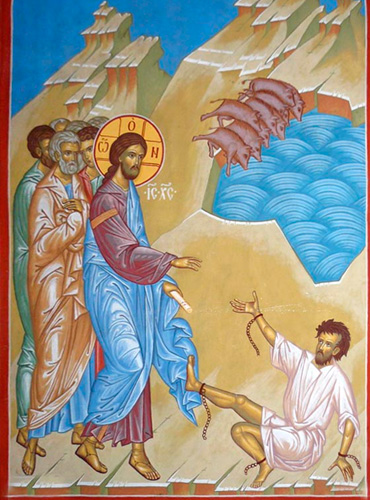Wednesday of the Thirteenth Week in Ordinary Time – Mt 8:28-34
Today’s Gospel presents us with Matthew’s recounting of the healing of two demoniacs; most Biblical scholars take the incident to be a parallel account of a similar event presented by Mark and Luke. While there is a lot we could say about the episode, two elements stand out: first, Jesus’ interaction with the demons, and, second, the response of the townspeople.
Regarding the first, it calls our attention that Jesus sends the demons into a herd of swine. Absolutely speaking, as God, Jesus didn’t have to send the demons there; after all, He’s God, and He doesn’t need material things like pigs to get rid of demons. Rather, if Christ send the demons into pigs, there’s a reason why it’s appropriate or fitting, and the Church Fathers offer two such motives.
First, because it offered proof for the townspeople that the men had really been healed, and miraculously at that. In Mark’s recounting of the event, the evangelist numbers the pigs at 2,000 (cf. Mk 5:13), and the sight of such a cascade of pigs jumping off of the cliff, into the sea, would’ve made the exorcism, and who the exorcist was, pretty clear.
Secondly, and perhaps more importantly for us, it reveals the value that men have before God. Although it’s hard to get a financial assessment of the damage inflicted on the herdsmen during this exorcism, the loss of 2,000 pigs would certainly have been costly. For the demons, it’s all the same: Saint Peter Chrysologus says, rather bluntly, that the demons weren’t thinking of getting rid of their bad odors, but rather of simply changing odors.[1] For the demons, there isn’t a difference between a man and a pig; for them, it’s all the same, smelly mess.
For Christ, however, the appraisal is quite different. Recall that this exorcism takes places right after yesterday’s Gospel; Christ wasn’t simply in the territory of these demoniacs because He happened to be wandering through on a pleasant stroll; He had taken the boat across the sea, through a storm, miraculously calmed the waves, and then disembarked, and took the path which, as God with all the knowledge in world, He already knew would be blocked by these men. Christ went deliberately to encounter them, to bring them healing and peace. Later in Matthew’s Gospel Christ will tell us, “So do not be afraid; you are worth more than many sparrows” (Mt 10:31). That phrase is perhaps more edifying than, “Do not be afraid; you are worth more than at least a thousand pigs,” but the truth is the same: Christ values us highly, wants us to be saved, and always takes the initiative.
This, however, brings us to our second point: the reaction of the townspeople. It’s surprising that after the men are healed, the townspeople beg Jesus to leave. That word for “beg,” the Greek παρακαλέω (parakaléō),[2] has the sense of a very up close and personal request; the people really didn’t want Jesus around; they echo the words of the demons. Commenting on the demons’ words, “What have you to do with us, Son of God?,” Saint Thomas Aquinas replies, “Absolutely nothing, because there’s nothing in common between Christ and Belial, [the devil].”[3] Or, as Saint Jerome says, “The presence of the Savior is the torment of demons.”[4] Demons will always be tormented by Christ and will beg Him to leave them alone; only man, and only in this life, can ask Christ to draw nearer, or to get lost.
Most Fathers of the Church say that the reason for the townspeople’s request is, in a sense, financial. After all, Jesus has only just arrived, and already the town is 2,000 pigs less. In a sense, though, the reply of the townspeople is even more sinister: they only know Jesus as an exorcist and probably there are many more demons in their town. Rather than suffer the financial loss, essentially, they’re telling Jesus, “Look, we’d like to keep the demons if it means we can keep our stuff.” Christ doesn’t force us to follow Him; if we want, we can hold on to our vices, our defects, and our shortcomings. To do that, however, is short-change ourselves, to value ourselves and our souls like a few swine. And that is precisely what the devil does and wants.
Let us pray, through the intercession of Mary, Queen of Heaven, for the grace to let go of our defects and sins so as to be able to follow Christ whole-heartedly.
[1] Cf. Sermons, 16.7.
[2] 3870 parakaléō (from 3844 /pará, “from close-beside” and 2564 /kaléō, “to call”) – properly, “make a call” from being “close-up and personal.” 3870 /parakaléō (“personally make a call”) refers to believers offering up evidence that stands up in God’s court
[3] Commentary on Saint John’s Gospel: “Vere nihil, quia nulla convenientia Christi ad Belial.”
[4] Cf. Catena Aurea.






